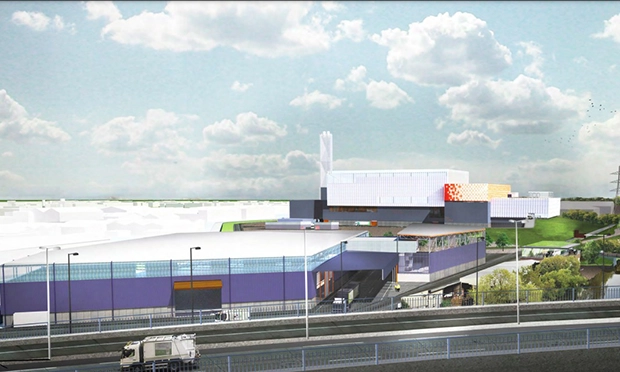Edmonton incinerator cost ‘spiralling out of control’, says campaign group

Illustrative view of facility from the South with the incinerator in the background. Image: NLWA
Campaigners have urged the North London Waste Authority to “go back to the drawing board” after learning the cost of a new incinerator has risen.
The North London Waste Authority (NLWA) admitted last month that its project to build a new, larger incinerator and recycling facilities in Edmonton is now likely to cost between £1.42-1.52 billion.
In 2019, the price tag was expected to be £1.2bn, already double an earlier estimate, which has risen since due to record levels of inflation and growing construction costs.
The rebuilt incinerator will have an annual capacity of 700,000 tonnes, an increase of 200,000 tonnes on the current facility, built in 1969.
At an NLWA board meeting, Carina Millstone, founder of the Stop the Edmonton Incinerator Now Coalition, said the costs are “spiralling out of control. It’s clear that the NLWA needs to go back to the drawing board with its plans and reformulate the business case for the new incinerator.”
She added that NLWA did not sufficiently consider “maintaining and upgrading” the current incinerator. The NLWA has repeatedly insisted that the current facility is on its last legs,
The project to rebuild the Edmonton EcoPark will include a new waste-sorting facility and electricity-generating incinerator, alongside an future carbon-capture plant.
While the waste-sorting facility is on the “home straight”, incinerator-builder Acciona is in the early stages of construction but “on plan” to hand over in late 2026.
At the meeting, programme director David Cullen said construction on an operational waste processing site is inevitably a complex process.
He added: “Keeping North London’s waste management going whilst building is a major challenge, but it is being successfully managed by the client team.
“The [budget] forecast provided takes full account of the complexities associated with this coordination.”
David said that despite major construction projects often being “susceptible to optimism” in the early stages, the risk of overspending has “diminished considerably” in the last four years.
Furthermore, he still felt confident that the budget will stay within the “contingency” limit, although he did not specify the size of this fund.
The authority’s chair and Waltham Forest Council’s deputy leader Clyde Loakes said it would be “remiss” to hone in on the waste project when inflation is a “national challenge”.
He added: “Lots of other [major infrastructure projects] have been severely challenged, particularly with regard to inflation, many of us will reflect on that budget last Autumn that messed with the market.”
United Kingdom Without Incineration Network’s (UKWIN) national Coordinator Shlomo Dowen said his group raised “serious value-for-money concerns” in a business case assessment of the project in 2020.
He added: “Unfortunately, the NLWA did not follow our recommendation to carry out a detailed public review of the project, in light of falling levels of residual waste and rising costs.
“Since then, the case for rebuilding the Edmonton incinerator has become weaker, while the need for the NLWA to pause and reconsider this expensive and unwanted scheme has grown stronger.”
Following pressure from Chingford and Woodford Green MP Iain Duncan-Smith earlier this year, the government “engaged” with the waste authority over its decision-making and governance.
The Department for Levelling Up, Housing and Communities took no further action, but emphasised NLWA’s “duties as a best-value authority” and reminded it to “act transparently”.
Emma Best, leader of Waltham Forest Council’s Conservative group said: “The project for an oversized Edmonton incinerator, above and beyond required capacity, continues to pose a threat to residents’ air quality and purses.
“We maintain the view that a pause and review of the project should take place and hope the NLWA, chaired by Waltham Forest’s deputy leader, will listen to experts, evidence and common sense.”
